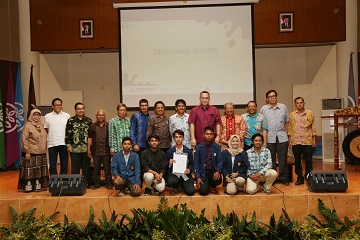IPB Prepares Coffee School to Support Indonesian Coffee Improvement

As Indonesia’s flagship export commodity, coffee is the main concern of all parties so that its quality remains superior and the production increases. To realize these efforts, a synergy between the government, farmers and academics or researchers is needed. As a university, Bogor Agricultural University (IPB) welcomed the challenge with the opening of the Coffee School specialization in the upcoming IPB vocational program in 2019.
The statement was delivered by the Chancellor of IPB, Dr. Arif Satria at the Coffee National Workshop on Saturday (12/15) at the Andi Hakim Nasution Auditorium, IPB Dramaga Campus, Bogor.
“It is interesting for us to talk about coffee because we don’t doubt its trend in the world. Now IPB is preparing a coffee road map, one of which is to open a coffee specialization at the Vocational School in 2019,” said Dr. Arif Satria.
According to him, coffee is a commodity that must be concerned from upstream to downstream by all parties. With the opening of the coffee specialization program, it is expected to be able to create a good farm system and post-harvest processes including food processing that can be guaranteed and produce quality products. He also hoped that through this coffee specialization program, qualified graduates who are ready to become reliable baristas can be produced.
On the same occasion, Dr. Arif Satria said that the trend of young people now prefers to drink coffee rather than drinking tea. He also planned to build a coffee shop for students.
The development of the coffee shop is intended to facilitate students to enjoy coffee between lectures. The coffee shop will be built adjacent to the student service center so students can apply for services while enjoying coffee.
In 2018, coffee contributed 34.5 percent of Indonesia’s plantation export contribution. The volume of coffee exports in 2018 amounted to 229.73 thousand tons with an export value of 669.5 million USD, equivalent to 10.19 trillion rupiah. These export volume and value have decreased from 2017 where the export volume reached 467.8 thousand tons, worth 1.19 billion USD which was equivalent to 16.08 trillion rupiah.
Director General of Plantation, Ministry of Agriculture of the Republic of Indonesia, Ir. Bambang MM stated that the contribution of plantations in general to Gross Domestic Product (GDP) was recorded at 471 trillion rupiah in 2017. Meanwhile, the achievement of plantation exports increased by 6.33 percent from 2017, which was only 341.7 trillion, to 432.4 trillion rupiah.
“The biggest challenge for young people and professors in Indonesia is at the level of coffee productivity which is still lagging behind other countries. Coffee production in Indonesia is only able to reach 0.6 tons per hectare, while Brazil is capable of producing coffee around 4 tons per hectare,” said Bambang.
Bambang said that the upstream area still dominates one of the problems of coffee plantation and business, which is the low productivity of Indonesian coffee (only 0.6-0.7 tons per hectare). This amount is still inferior compared to Vietnam which has exceeded 2 tons per hectare. On the other hand, coffee plantations which are still dominated by smallholder plantations are also serious problems that need to be addressed. As much as 96.11 percent of coffee plantation land in Indonesia is still managed by farmers so an assistance from various parties is needed.
According to him, the assistance of farmers is important because the quality of coffee products is also determined by the proper and correct coffee cultivation process. The assistance is needed in the whole process, starting from cultivation until the post-harvest of the fruits.
“What we need to pursue now is superior coffee products, both in quality and quantity. The typical Indonesian coffee is specialty coffee which may not exist in other countries, thus, its quality and quantity need to be maintained and increased,” said Bambang. (rosyid/Zul/ZSP)



